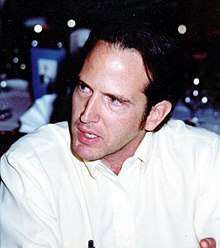Tim Stryker
Timothy J. Stryker, better known as Tim Stryker or Stryker (9 December 1954 – 6 August 1996) was a computer programmer, best known as the creator of MajorBBS, a computer bulletin board software package.
Tim Stryker | |
|---|---|
 Tim Stryker at TwoBBScon event in Düsseldorf, Germany | |
| Born | Timothy J. Stryker 9 December 1954 |
| Died | 6 August 1996 (aged 41) |
| Nationality | American |
| Other names | Stryker |
| Occupation | Computer programmer |
| Known for |
|
Education
Stryker graduated from Northfield Mount Hermon School in 1972, and received his bachelor's degree in physics from Brown University in 1977.
Flash Attack
Stryker and Ken Wasserman wrote the game Flash Attack for the Commodore PET computer, and developed a cable so that two PET computers could be linked to play against each other.[1] One of the earliest real-time strategy computer games, it was later rewritten for DOS machines, and allowed up to four players in realtime, interconnected modems dialed into MajorBBS.
Aztarac
Stryker authored the Centuri arcade vector game Aztarac in 1983. Although not a commercial success, this arcade game is highly prized by collectors not only for its rarity, but for its graphics. During the attract mode of the game, quickly spinning the spinner control reveals a hidden message in the starfield: "Designed by T. Stryker".
MajorBBS / Galacticomm
Stryker founded Galacticomm in 1985, and created MajorBBS which supported real-time teleconference, gaming, discussion forums, user profiles (registry), and file transfer sections.
Later in Galacticomm's development, Stryker hired Scott Brinker, originally of Moonshae Isles BBS, who created many of the early games available for MajorBBS, including the original game Kyrandia. The two of them were the heart of Galacticomm.
Electronic democracy
Tim Stryker was a staunch advocate of electronic democracy, and began a movement called Superdemocracy to computerize voting and help people follow politics in cyberspace. He dreamed of creating the "perfect society based on compassion and love".[2][3]
Death
Stryker suffered from severe depression, and was found dead of a self-inflicted shotgun wound in the mountains of Colorado on 6 August 1996 at the age of 41.
Published works
- Stryker, Tim (1993). Think a little: Evolutionary Perspectives On The Future Of Civilization (1 ed.). Boca Raton, Florida: Cool Hand Communications. ISBN 1-56790-025-9.
Published art
- STRYKER ART (1993-1994) - Stryker produced several computer art images, from which only 150 prints each were made, and each one was numbered, signed and dated by the artist. The printing technique took the digital output of the artist's custom computer software directly to transparencies, from which each print was lovingly created, direct-to-positive on ultra-high-gloss Fuji film. STRYKER ART was distributed by Consensus Systems, Inc. in Plantation, Florida.
Unpublished works
- What Goes Around (1995 - preliminary copy available)
References
- Wasserman, Ken; Stryker, Tim (December 1980). "Multimachine Games". BYTE Magazine. p. 24. Archived from the original on 2019-03-03. Retrieved 2013-10-18.
- Chebium, Raju (1996-08-06). "Genius succumbs to darkness - Computer whiz had it all, but it wasn't enough - Computer Genius, Entrepreneur Cuts Short Bright Future - Tim Stryker, founder of Galacticomm and maker of The MajorBBS and Worldgroup BBS Software, commits suicide in the Blue Mountains of Colorado". Associated Press. Archived from the original on 2018-03-18. Retrieved 2015-10-27.
- Chebium, Raju (1996-10-08). "Computer Genius, Entrepreneur Cuts Short Bright Future". Associated Press. Archived from the original on 2016-03-03. Retrieved 2019-12-27.
Further reading
- Wasserman, Katherine (2001). "Notes on Tim Stryker, Flash Attack, RPL etc". Archived from the original on 2017-03-13. Retrieved 2017-03-13.
- Stryker, Tim (1981). rpl - A Compiled Language for the PET/CBM Series of Computers (PDF) (Manual). Samurai Software. Archived (PDF) from the original on 2017-03-13. Retrieved 2017-03-13.
- Flash Attack Page about Flash Attack, with notes on link cable
- Aztarac at the Killer List of Videogames
- BBS: The Documentary Historical Reference to BBSing, and the people who created the systems.
- The Major BBS Restoration Project Historical information about Galacticomm, The Major BBS, and its software vendors.